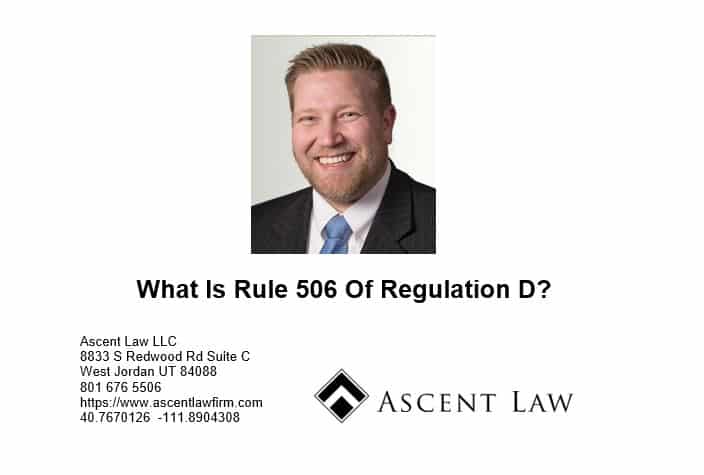

The requirement to exclude target securities held by the acquiror remains unchanged, however. The amendments adopted by the Commission in 2008 eliminated the requirement to exclude greater than 10 percent target holders from the calculation of U.S. See, e.g., Securities Act Rule 800(h)(2) Instruction 2.ii to paragraphs (c) and (d) of Exchange Act Rule 14d-1. ownership for purposes of determining eligibility under the cross-border exemptions?Īnswer: Yes.

Question: Are the securities held by the acquiror excluded from the calculation of U.S. target security holders in a cross-border tender offer). 33-8957 (September 19, 2008), Section II.G.2 (discussing the exclusion of U.S. See General Note 2 to Securities Act Rules 800, 801 and 802. An offer conducted with this purpose or intent could be viewed to be a part of a plan or scheme to evade Securities Act registration, thereby rendering the cross-border exemptions unavailable.
#Sec reg d lookthrough entity that holds stock registration#
security holders from the exchange offer either with the purpose or intent of causing a migration of securities from the United States to the foreign jurisdiction so that an exemption from Securities Act registration would then become available. ownership falls to 10 percent or below and qualifies for the Tier I exemption?Īnswer: This scenario would raise concerns if the facts and circumstances indicate that the bidder excluded U.S. ownership exceeds 10 percent and then later extend the same offer to U.S.

security holders from an exchange offer made in a foreign jurisdiction at a time when U.S. The term is used generically to refer to the surviving entity, whether or not it is an Exchange Act reporting company after the completion of the business combination, and is unrelated to the concept of being a successor registrant for purposes of Exchange Act Rule 12g-3. Does the reference to “successor registrant” mean that the acquiror must be an Exchange Act reporting company after the completion of the business combination?Īnswer: No. holders may hold no more than 10 percent of the class of securities of the successor registrant immediately after the completion of the business combination. Question: Securities Act Rule 802(a)(1) states that in a business combination in which the securities are to be issued by a “successor registrant,” U.S. In this case, while the warrant flush is not regulated as a tender offer in the home jurisdiction, other provisions of the home jurisdiction’s securities laws do apply to the transaction and provide protection to subject security holders. rules, but on the presence of an applicable foreign regulatory regime in the home jurisdiction that provides a regulatory framework for the offer. The cross-border exemptions are not premised on the applicability of specific rules in the home jurisdiction that are directly comparable to U.S. Can the issuer rely on the Tier I exemption in Exchange Act Rule 13e-4(h)(8) where the transaction is not subject to tender offer regulation in the home jurisdiction?Īnswer: Yes. rules, this may be considered an issuer tender offer under the laws of the subject company’s home jurisdiction, it is not subject to tender offer regulation, although other provisions of the home jurisdiction’s securities laws apply. Question: A foreign private issuer seeks to do a “warrant flush” whereby it will reduce the exercise price of its outstanding warrants for a set period of time in an effort to induce warrant holders to exercise. security holders in the offering, not to provide an exemption for offerings made only to foreign security holders. These exemptions are intended to create an incentive to include U.S. See General Note 2 to Rules 800, 801 and 802. security holders of the issuer (in a rights offering) or subject company (in an exchange offer or business combination), or the offer is not extended to U.S. Question: Are Securities Act Rules 801 and 802 available when there are no U.S. The bracketed date following each C&DI is the latest date of publication or revision. The remaining C&DIs reflect newly published interpretations. C&DIs 100.01, 101.09, 104.04, and 105.01 reflect only non-substantive changes to the Telephone Interpretations. C&DIs 100.04 and 101.01 reflect technical revisions to the Telephone Interpretations. In particular, C&DIs 101.03, 103.01, 104.02, 104.03, and 104.05 reflect substantive changes to the Telephone Interpretations. They replace the interpretations published in Section II of the July 2001 Interim Supplement to Publicly Available Telephone Interpretations (the “Telephone Interpretations”). These Compliance and Disclosure Interpretations (“C&DIs”) comprise the Division’s interpretations of the cross-border exemptions.


 0 kommentar(er)
0 kommentar(er)
